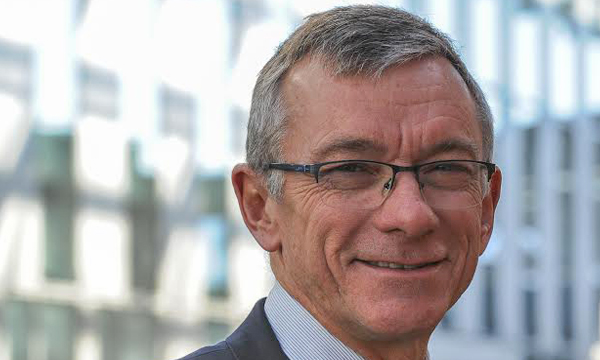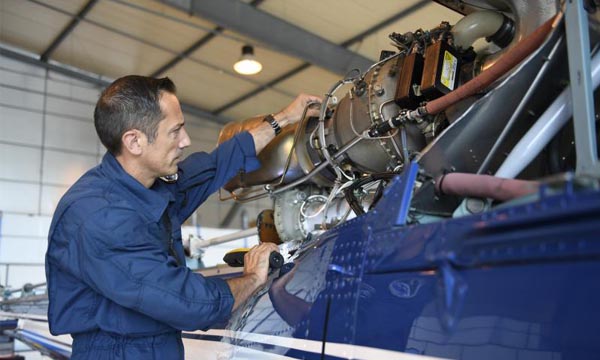Olivier Le Merrer (Safran Helicopter Engines): "This is just the start of an adventure" |
| Interview by Léo Barnier |
|
|
29 NOV 2018 | 1515 words
|
 |
© R. Bertrand / Safran |
|
|
|
The joint location (for the last time) of the Helitech and MRO Europe exhibition in Amsterdam in October provided the perfect opportunity to meet Olivier Le Merrer, Executive Vice-President, Support and Services at Safran Helicopter Engines. Appointed at the start of the year after a career lasting over twenty five years in the Safran group's different entities, he talks about the new services provided by the engine manufacturer and their acceptance by a market which is still fragile.
How are things going with the Health Monitoring service, which celebrated its first birthday at Helitech 2018?
Things are going well. Three hundred customers are already using this Health Monitoring service, with around 1700 engines covered. We propose different versions of it: a basic version called Essential and a "Premium" version with an extended service. This is just the start of an adventure, but it's a very good start in terms of dynamic and clear interest.
Are you keeping to your market plan?
We thought that it would be a success from the outset given that it provided a response to something the market was expecting. After that, it's up to the customers to decide on the market plan. There will probably be a snowball effect as customers build up experience with it and see the value in the service's ability to adapt maintenance practices to their uses. It'll probably take another two years for the initial returns to drive this snowball effect. That's what we're expecting.
What size of market are you counting on?
We currently have almost 18 000 engines installed. It'll take time before we have them all covered. I think that the deployment rate over the first two years will be the same as we've had until now. I think that 5000 engines covered within two or three years is achievable.
And in two years' time will you be seeing the first operational effects of your data gathering?
We're already seeing them, but most of our customers are still on the Essential package. I think that we'll see the maximum benefits when the Premium version is rolled out. Here I think we'll probably see the expected effects within two years. That's why I mentioned this snowball effect.
So, this Premium version which has an analysis and recommendations is still being set up?
No, it's in place already, but it's a service for which we have a different commercial policy. It provides our customers with more added value, but it requires more analysis and back office work from us. It's clear that we'll get the full benefits of this version in two years' time.
Have you already calculated the potential operational benefits for an operator in terms of increased availability, reductions in interruptions, elimination of AOG, and so on?
We haven't got the figures but we do have an idea of the quality. This will depend a great deal on the operators, who have quite different roles. Consequently, the expected benefits for the service will also result from the operating conditions.
With this type of solution are you targeting all operators or just the largest fleets?
We are targeting all types of operator, with no exclusions. Afterwards, of course there is a larger appetite from operators who have a certain volume and a certain maturity. These were the first to react when the offer was launched.
You have just segmented your SBH (Support-By-the-Hour) offer between small and large operators and military customers. What's the reasoning behind that?
It's about flexibility. We already had segmentation for military contracts, where we promote the GSP (Global Support Packages) a lot, which are availability contracts. Because not all military operators need to commit to this type of contract, we created the SBH M which are customised for their needs and let them control these costs.
We then saw that for the civilian part the SBH formulae we had been proposing until now were having a certain amount of trouble in being picked up by small operators. Here again we provided more flexibility to these contracts by launching our BH 5Star offer, to what we call the "Small Fleet Operators", who make up the majority of our customers, even if this is not the case in terms of the number of engines.
The idea is to be able to offer this service in a more accessible way to smaller operators. We have listened to them and we have tried to understand why they were reticent or had trouble adopting our SBH contracts, which are an extremely virtuous system from which everyone can benefit - both operators and us.
 Safran Helicopter Engines has segmented its SBH offer to increase its penetration rate with small operators. © A. Pecchi / Safran
Safran Helicopter Engines has segmented its SBH offer to increase its penetration rate with small operators. © A. Pecchi / Safran
Does this SBH 5Star offer, which is targeted at operators with up to five helicopters, provide for more customisation than the SBH Classic offer?
It's not customisation on a case by case basis: there are 5 levels of service, with different and progressive degrees of coverage. Options specific to Small Fleet Operators have been created and each service is proposed as a "turnkey" service, i.e. as an adapted package.
You said that around 40% of your flying hours were covered by these SBH services. Do you have growth objectives after segmenting your offer?
Yes, we have growth objectives. One of the specific levers to achieve this growth is to have a higher SBH penetration rate for our Small Fleet Operators. Extending our SBH offer also responds to this need.
We feel that its a "win-win" formula, one which drives everyone upwards, since it provides the customer with excellent cost control and also gets them to take their share of the risk from the OEM. Moving towards more and more SBH contracts is clearly part of our strategy, without us having any calculated objectives or time frame in mind as this depends a lot on acceptance by the market. We are moving forward pragmatically.
Has the contracting helicopter market over the last few years, with the drop in the numbering of flight hours, had an impact on your SBH offer? Have you felt it and had it meant a loss of revenue?
In that we have a service which is invoiced on flight hours, of course, a drop in activity has an impact on our income. SBH contracts are reaching their expiry data and fleets are now being taken out of service. That's the reality of the current market. We are seeing an offshore sector that is having trouble getting going again, with a few scattered signs that remain fragile. It's a market segment that is having difficulty finding its balance again after the major crisis that occurred and which is still heavily influenced by prices with a highly noticeable excess capacity of helicopters. This balance will probably take another two years to be established.
And yet this impact has been contained as we have continued to increase the penetration rate for our SBH offer at the same time. We have shown a certain amount of resilience.
Apart from these fleets, is the SBH renewal rate positive?
This rate is positive. We are continuing to increase our coverage by SBH contracts. Last year over 100 contracts were signed. The operators are very satisfied and while they continue to fly with our engines they are all renewing their contracts. I can't think of an operator who has switched from an SBH to a "time & material" contract.
In June you announced a partnership with Airbus Helicopters for the Écureuil family to increase the intervals between two services (TBO) from 4 000 to 5 000 hours, and the warranty periods from 2 to 3 years. Where are you in terms of putting this in place?
We've made good progress. We have extended the TBO on this engine family (the Arriel 2Ds, ed.) to meet the needs to reduce DMC (direct maintenance costs, ed.). This is a step which we are perfectly happy with and which is contributing to the competitiveness of our engines and the Airbus Helicopters offer. But we never finish moving forward. Discussions are continuing, in the context of more detailed operational data analysis, to move towards predictive maintenance or even extensions on a case by case base according to how the engines are used.
Écureuil family sales have been picking up for the last two years after more historic lows. Are you seeing an impact of their measures on orders?
I don't know if we can link the success of the Écureuil family to this specific point. It's a more general competitiveness approach. We want to have partner relationships with our customers whoever they are, whether they're Airbus Helicopters or other major integrators, and we assist them through joint competitiveness improvement actions. This is what we've always done in the past and we are still demonstrating this today.
|
|
 |
Léo Barnier
Specialized journalist
Industry & Technology, Equipments, MRO
|
|
| |
They made this section possible |
|
|
|
|
|
|
|
|
|
|
|
|
|
|
|
|
Top stories |
|
|
|
|
|
Top stories
|